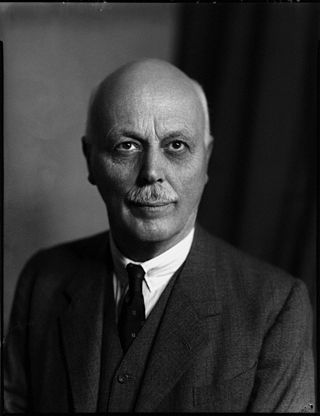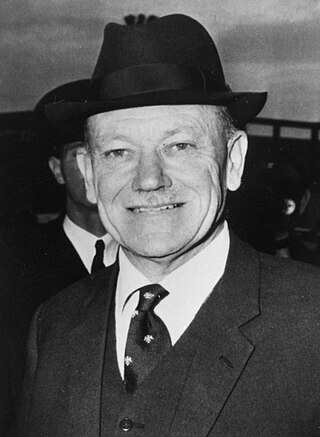Related Research Articles

Sir Roland "Roy" Welensky was a Northern Rhodesian politician and the second and last Prime Minister of the Federation of Rhodesia and Nyasaland.

Clifford Walter Dupont was a British-born Rhodesian politician who served in the internationally unrecognised positions of officer administrating the government and president. Born in London and qualifying as a solicitor, Dupont served during the Second World War as an officer of the British Royal Artillery in North Africa before first visiting Southern Rhodesia in 1947. He returned a year later, started a ranch and emigrated full-time during the early 1950s, by which time the country had become a territory of the Federation of Rhodesia and Nyasaland.

John James Wrathall, was a British-born Rhodesian politician. He was the last white President of Rhodesia. He formerly worked as a chartered accountant.

The United Federal Party (UFP) was a political party in the Federation of Rhodesia and Nyasaland.

Winston Joseph Field was a Rhodesian politician who served as the seventh Prime Minister of Southern Rhodesia. Field was a former Dominion Party MP who founded the Rhodesian Front political party with Ian Smith.

Sir Edgar Cuthbert Fremantle Whitehead, was a Rhodesian politician and statesman who served as Prime Minister of Southern Rhodesia from 1958 to 1962. He had a long and varied political career, serving as a longstanding member of the Southern Rhodesian Legislative Assembly and in a variety of minister posts over the course of nearly three decades. simultaneously serving in a variety of government position posts. His work was frequently interrupted by recurring health problems; he suffered from poor eyesight and later experienced deafness whilst in office. An ally of Sir Roy Welensky, he was Prime Minister of Southern Rhodesia from 1958 to 1962. His government was defeated in the 1962 general election by the Rhodesian Front.

General elections were held in Southern Rhodesia on 14 December 1962. Voters elected 65 members of the Legislative Assembly. The election was notable for bringing to power the Rhodesian Front, initially under Winston Field, which set the colony on the course for its eventual Unilateral Declaration of Independence.
Ahrn Palley was an independent politician in Rhodesia who criticised the Smith administration and the Unilateral Declaration of Independence. Ian Smith described him as "one of the most able politicians this country has produced, and although our political philosophies did not coincide, we always respected one another and maintained friendly relations."

The Rhodesia Labour Party was a political party which existed in Southern Rhodesia from 1923 until the 1950s. Originally formed on the model of the British Labour Party from trade unions and being especially dominated by railway workers, it formed the main opposition party from 1934 to 1946. The party suffered a catastrophic split during the Second World War and lost all its seats, and a further split over the attitude to the Federation of Rhodesia and Nyasaland ended its involvement in Rhodesian politics.

The Federation of Rhodesia and Nyasaland, also known as the Central African Federation (CAF), was a colonial federation that consisted of three southern African territories: the self-governing British colony of Southern Rhodesia and the British protectorates of Northern Rhodesia and Nyasaland. It existed between 1953 and 1963.
The Responsible Government Association (RGA), called the Rhodesia Party from 1923, was a political party in Southern Rhodesia. Founded in 1917, it initially advocated responsible government for Southern Rhodesia within the British Empire, as opposed to incorporation into the Union of South Africa. When responsible government was achieved in 1923, the party became the governing Rhodesia Party. It endured until 1934, when it merged with the right wing of the Reform Party to create the United Party, which remained in power for 28 years afterwards, and was itself defunct by 1965.

The modern political history of Zimbabwe starts with the arrival of white people to what was dubbed Southern Rhodesia in the 1890s. The country was initially run by an administrator appointed by the British South Africa Company. The prime ministerial role was first created in October 1923, when the country achieved responsible government, with Sir Charles Coghlan as its first Premier. The third Premier, George Mitchell, renamed the post Prime Minister in 1933.

Sir Allan Ross Welsh was a Rhodesian lawyer and politician. He was Speaker of the Southern Rhodesian Legislative Assembly from 1935 to 1952.
William John Harper was a politician, general contractor and Royal Air Force fighter pilot who served as a Cabinet minister in Rhodesia from 1962 to 1968, and signed that country's Unilateral Declaration of Independence (UDI) from Britain in 1965. Born into a prominent Anglo-Indian merchant family in Calcutta, Harper was educated in India and England and joined the RAF in 1937. He served as an officer throughout the Second World War and saw action as one of "The Few" in the Battle of Britain, during which he was wounded in action. Appalled by Britain's granting of independence to India in 1947, he emigrated to Rhodesia on retiring from the Air Force two years later.

Sir Thomas Hugh William Beadle, was a Rhodesian lawyer, politician and judge who served as Chief Justice of Southern Rhodesia from March 1961 to November 1965, and as Chief Justice of Rhodesia from November 1965 until April 1977. He came to international prominence against the backdrop of Rhodesia's Unilateral Declaration of Independence (UDI) from Britain in November 1965, upon which he initially stood by the British Governor Sir Humphrey Gibbs as an adviser; he then provoked acrimony in British government circles by declaring Ian Smith's post-UDI administration legal in 1968.

The Monckton Commission, officially the Advisory Commission for the Review of the Constitution of the Federation of Rhodesia and Nyasaland, was set up by the British government under the chairmanship of Walter Monckton, 1st Viscount Monckton of Brenchley, in 1960. Its purpose was to investigate and make proposals for the future of the Federation of Rhodesia and Nyasaland, made up of Southern Rhodesia, Northern Rhodesia and Nyasaland—respectively equivalent to today's Zimbabwe, Zambia and Malawi.
Harry Herbert Davies was a Southern Rhodesian Labour politician and Leader of the Opposition in the territory's Legislative Assembly from 1929 to 1944. Originally from Wales, he moved to Southern Rhodesia in 1920 and became an estate agent in Bulawayo. He ran for the Southern Rhodesian Labour Party in Bulawayo District in the 1924 general election, but was not elected. After standing successfully in Bulawayo South in the 1928 election, he sat in the Southern Rhodesian Legislative Assembly for 20 years. In 1929 he was elected leader of the Southern Rhodesian Labour Party, thereby becoming Leader of the Opposition, a post he held until 1944.
The Dominion Party was a political party in the Federation of Rhodesia and Nyasaland, led by Winston Field.
George Rollo Hayman was a Rhodesian farmer and politician. A member of the House of Assembly, he served in several portfolios as a member of the Cabinet of Rhodesia under Prime Minister Ian Smith. Born in the United Kingdom, he moved to Southern Rhodesia at age four and served as a Royal Air Force pilot in World War II.
References
- 1 2 3 4 5 6 Who's who of Southern Africa. Ken Donaldson (Pty.) Limited. 1959. p. 1065.
- 1 2 3 4 5 Science, University of Rhodesia Dept of Political (1963). Source Book Series. p. 183.
- ↑ Salt, Beryl (2015). A Pride of Eagles: A History of the Rhodesian Air Force. Helion and Company. p. 77. ISBN 9781910777480.
- ↑ "Rhodesian Leaders". www.rhodesia.me.uk. Retrieved 22 April 2018.
- ↑ Steinberg, S. (1962). The Statesman's Year-Book 1962: The One-Volume ENCYCLOPAEDIA of all nations. Springer. p. 496. ISBN 9780230270916.
- ↑ "The Rhodesia Air Training Group (RATG) 1940 – 1945 and statistics on fatalities from the Commonwealth War Graves Commission (CWGC): Zimbabwe Field Guide". zimfieldguide.com. Archived from the original on 28 July 2018. Retrieved 22 April 2018.
- 1 2 Who's who of Southern Africa. Ken Donaldson (Pty.) Limited. 1972. p. 1306.
- 1 2 International Planned Parenthood News. 1956.
- ↑ Woman Plus. ZWRCN. 1999. p. 31.
- ↑ Profiles of Rhodesia's Women. National Federation of Business and Professional Women of Rhodesia. 1976. p. 15. ISBN 9780797401679.
- ↑ Federation of Rhodesia and Nyasaland Newsletter. Federal Information Department, Government of Rhodesia and Nyasaland. 1961. p. 33.
- 1 2 Franck, Thomas M. (1963). Southern Rhodesian nationalism in the East Central African conflict. American Society of African Culture. p. 26.
- ↑ East Africa and Rhodesia. Africana. 1964. p. 522.
- ↑ Library, Bulawayo (Zimbabwe) National Free (1968). Annual Report of the Board of the National Free Library of Rhodesia for the Year Ended ... Government Printer.